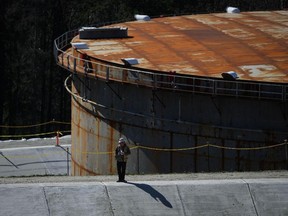Coastal GasLink hits 90 percent completion
Pipeline will soon be fully operational
By Rob Brown, Alaska Highway News | June 29, 2023,

TC Energy officials expect final construction season for Coastal GasLink to be busy. | TC Energy
Coastal GasLink has achieved 90 per cent overall completion. Contributing to this major milestone, pipe installation is now complete in Section 6, which means three out of eight sections have now achieved full pipe installation, and more than 622 km of pipe has been installed along the 670-km route.
Officials expect their final construction season to be busy.
"In the coming months we expect more than 6,000 women and men to be working along the project route as we set our sights on 100 per cent construction completion by the end of the year. The last 10 per cent of the Project will focus on technically challenging sections, complex workfronts, integrity testing and remaining watercourse crossings."
Wildfire response
Coastal GasLink notes they remain committed to the safety of the environment and communities.
"As we continue to closely monitor the wildfire situation across the province. Our workforce is on high alert, and crews are in place project-wide that are trained and fully equipped to suppress fires that could occur in the area," they said Thursday in a statement.
editor@dcdn.ca
By Rob Brown, Alaska Highway News | June 29, 2023,

TC Energy officials expect final construction season for Coastal GasLink to be busy. | TC Energy
Coastal GasLink has achieved 90 per cent overall completion. Contributing to this major milestone, pipe installation is now complete in Section 6, which means three out of eight sections have now achieved full pipe installation, and more than 622 km of pipe has been installed along the 670-km route.
Officials expect their final construction season to be busy.
"In the coming months we expect more than 6,000 women and men to be working along the project route as we set our sights on 100 per cent construction completion by the end of the year. The last 10 per cent of the Project will focus on technically challenging sections, complex workfronts, integrity testing and remaining watercourse crossings."
Wildfire response
Coastal GasLink notes they remain committed to the safety of the environment and communities.
"As we continue to closely monitor the wildfire situation across the province. Our workforce is on high alert, and crews are in place project-wide that are trained and fully equipped to suppress fires that could occur in the area," they said Thursday in a statement.
editor@dcdn.ca
Trans Mountain's rising shipping costs are drawing the ire of Canada's largest oil producers
Pipeline’s price tag has risen to almost $31 billion, up more than fivefold since it was first proposed

Article content
Some of the largest oil producers in Canada are objecting to potentially rising costs and fees to ship their crude on the expanded Trans Mountain pipeline, underscoring growing disappointment with the highly anticipated project.
BP PLC, Suncor Energy Inc., Canadian Natural Resources Ltd., Cenovus Energy Inc. and PetroChina have filed letters with the Canada Energy Regulator voicing concerns about how much of the project’s cost overruns they’ll have to pay for as well as how the pipeline plans to handle fees for late shipments. Trans Mountain will provide a reply to comments by Friday, the company said by email.
The Trans Mountain expansion — which will nearly triple the system’s capacity to 890,000 barrels a day — was supposed to provide a fast and relatively cheap way to sell Canadian crude into Asian markets through shipping terminals near Vancouver, breaking producers’ dependence on United States refiners. But environmental opposition and construction challenges have delayed the line and boosted its costs. The resulting higher tolls may make Trans Mountain a more expensive way to reach Asian buyers than shipping through the U.S. Gulf Coast.
The pipeline’s price tag has risen to almost $31 billion, up more than fivefold since it was first proposed more than a decade ago. Producers that signed contracts to ship on the line are on the hook to pay for about 20 per cent to 30 per cent of the cost increase via higher tolls. These so-called uncapped costs have climbed to $9.09 billion from $1.77 billion in 2017.
The total fixed tolls for shipping the full length of the conduit from Edmonton to the Westridge Marine Terminal range from $9.54 to $11.46 a barrel, depending on how many years the shippers have committed to the line.
Trans Mountain has asked the regulator to approve its proposed interim tolls by Sept. 14, but hasn’t provided a clear start date for the project. Typically, the new tolls for a pipeline are approved just 30 days before the start of service.
Advertisement 4
Article content
Trans Mountain hasn’t provided producers with “substantive or detailed information” regarding the uncapped costs, making it hard for them to tell whether the expenses were properly allocated to the portion shippers have to pay for and whether they are “just and reasonable,” Canadian Natural Resources said in its letter to the regulator.
“The level of proposed increase in the tolls will negatively impact netbacks obtained by Canadian producers and may adversely and materially impact the overall competitiveness of Canada’s oil industry and the public interest,” CNRL said.
RECOMMENDED FROM EDITORIAL
Companies are also objecting to the size of the fees for late shipments, known as demurrage charges, as well as provisions that would allow the pipeline to delay shipments and thus generate those fees for its own account.



No comments:
Post a Comment